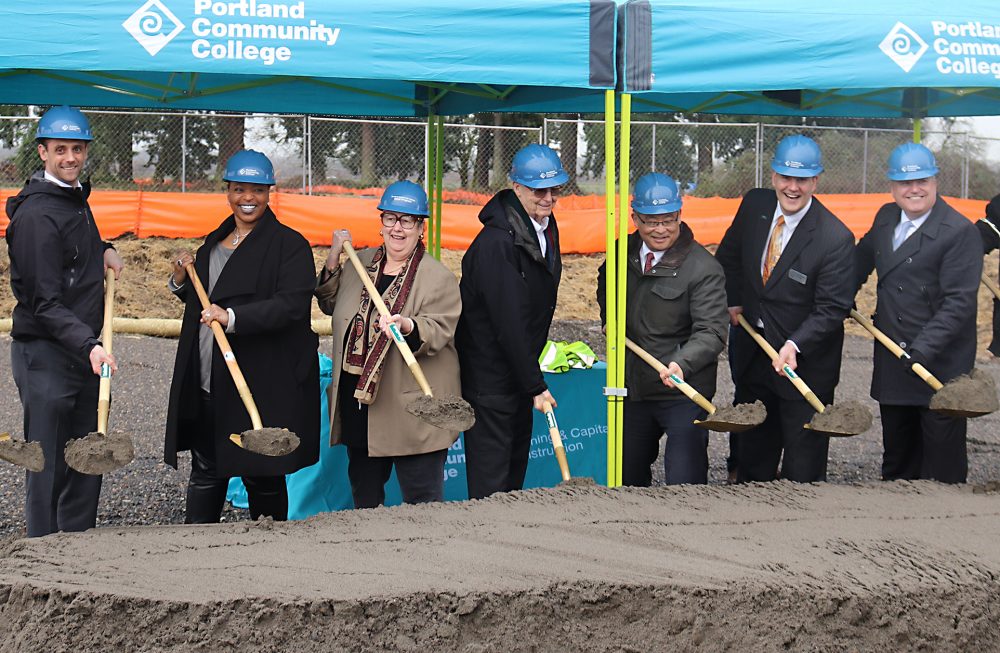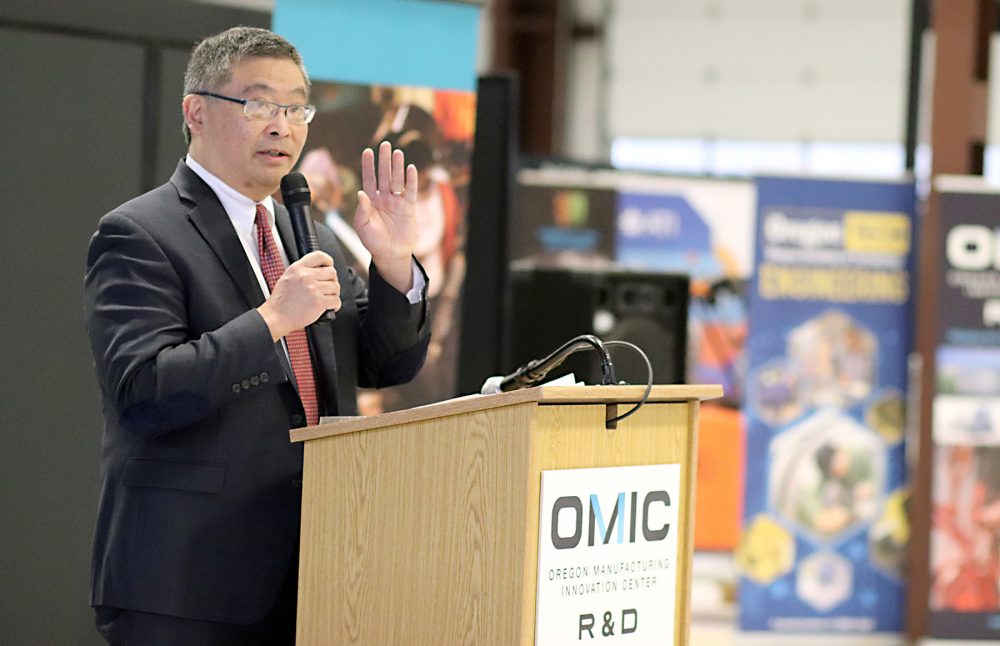This content was published: February 10, 2020. Phone numbers, email addresses, and other information may have changed.
PCC, partners dig into new era for training in Columbia County
Photos and story by James Hill

Left to right, PCC OMIC Director Andrew Lattanner, PCC Board Trustee Tiffani Penson, State Sen. Betsy Johnson, PCC Board Chair Jim Harper, PCC President Mark Mitsui, OMIC R&D Executive Director Craig Campbell and Scappoose Mayor Scott Burge.
History was made in Columbia County. Last month, Portland Community College officially broke ground on its first permanent training center in the region.
PCC President Mark Mitsui and the college’s elected Board of Directors hosted a ceremony and groundbreaking at the future site of its Oregon Manufacturing Innovation Center (OMIC) Training Center, located at 33701 Charles T. Parker Way in Scappoose. Sen. Betsy Johnson and Rep. Brad Witt were among the many state legislators present, in addition to Scappoose Mayor Scott Burge, OMIC R&D Executive Director Craig Campbell, and several other dignitaries.
PCC has offered a variety of courses and programs in Columbia County over the years. It has developed a longstanding, successful welding program partnership with St. Helens High School, and in alliance with Scappoose High School the college has begun offering two apprenticeships there. But this is the first time PCC will have a dedicated facility in the region.
“This marks the beginning of a new chapter in the college’s history and a permanent presence in Columbia County,” Mitsui said. “Today’s groundbreaking really symbolizes a commitment to partnership, to educate and train the next generation, create career opportunities in the community, and provide Oregon’s manufacturing sector with a world class workforce that it needs.”
PCC is constructing its training center on 17 acres as part of the Oregon Manufacturing Innovation Center campus. Slated to open early 2021, PCC’s OMIC Training Center will prepare the next generation of skilled workers through an innovative apprenticeship model and will expand on existing educational opportunities in Columbia County. The construction is funded by the 2008 voter-approved PCC bond measure.
“This facility can have a profound impact not only on the people’s lives here in Columbia County and Oregon, but worldwide,” said Sen. Johnson. “It is an opportunity for PCC to take its place on a much larger stage.”
The center will be a hub for advanced manufacturing training, including Machining, Computer Numerically Controlled Operation, Welding and Mechatronics, complementing OMIC’s R&D work. Programming will be based on an apprenticeship model in order for students to develop industry-aligned skills. In addition, PCC will provide career-technical education and other courses as needed by the community.
“Our presence here opens up a new chapter for Portland Community College, one that has been a long time coming,” added PCC Executive Vice President Sylvia Kelley.
What They Said:
“This is a truly glorious day,” said Rep. Brad Witt. “Not only for Scappoose, but for our entire region. I think this holds hope for an entirely new approach to the way that we deal with education and training, not only locally, but across our nation.”
“I’m really excited to have a community college in our community,” said Scappoose Mayor Scott Burge. “It is transformational, and it’s going to change everything in the city. We’re looking forward to it.”
“We have the right property, we have the right location, we have the right project, and we have the right partners,” said Linda Degman, director of PCC’s Planning & Capital Construction division. “I know it’s taken time to get here, but when it’s right, it’s right.”
“This creative collaboration is critically important when you have an organization like OMIC R&D, which is developing new techniques,” said Craig Campbell, executive director of OMIC R&D. “PCC’s training center is going to be training young people who are going to be able to go into the workplace, learn skills and equip themselves so that they can not only fill the jobs of today, but develop skills throughout their careers as manufacturing techniques change.”





I understand that this is caused partly by complex legal issues and red tape, but nonetheless – it is really hard to understand how PCC has seemingly unlimited funds for building and remodeling facilities, but claims to have no money available to pay employees a livable wage.
If the underlying problems with the allocation process are not resolved, PCC will eventually have hundreds of state-of-the-art buildings – and they will all be empty.
The OMIC project is funded through the 2008 voter-approved bond measure, which are construction funds that cannot be used for general budget purposes like wages. For more details, visit the project website: https://www.pcc.edu/bond/current-projects/omic/